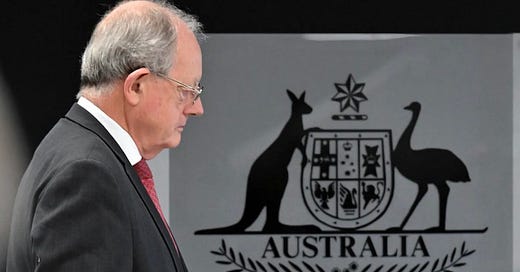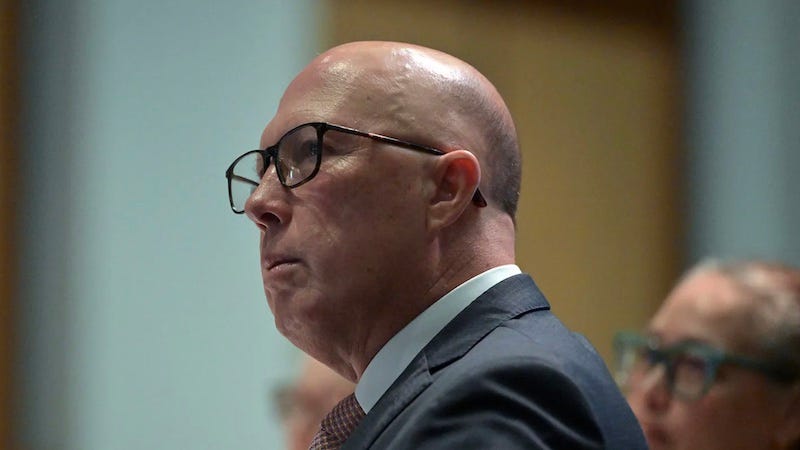NACC fails to deliver, corruption wins again
The new anti-corruption commission risks becoming irrelevant and just another toothless watchdog, unable to serve the very purpose for which it was created.
The National Anti-Corruption Commission finds itself in the spotlight once again, this time over its determination that there was ‘no corruption’ in the notorious Paladin affair. This was a case in which the previous Liberal–National Coalition government paid $532 million to the Paladin security company to manage three refugee centres on Manus Island from 2017 onwards, and these payments occurred during the Turnbull and Morrison governments, and at a time when Peter Dutton was the Minister for Home Affairs.
Paladin was no ordinary security company. Initially known as High Risk Security – the name alone should have raised eyebrows – but instead, it was awarded a massive government contract despite glaring red flags. Paladin’s headquarters was a beach shack on Kangaroo Island, and the company had no prior experience in managing immigration detention centres. Yet, inexplicably, it still ended up receiving over half a billion dollars in taxpayer funds. This affair didn’t just raise suspicions due to the company’s inexperience – there were allegations of money laundering, mismanagement, and claims of people being paid for work not being performed at all.
Adding to the intrigue, Paladin was the only company invited by the government to tender for these services, a process that typically involves competitive bids – this alone should raise questions about transparency and political favouritism.
Despite these glaring signs of misconduct, the NACC’s investigation into the affair, dubbed Operation Bannister, concluded that there was no evidence of corrupt conduct, with the Commission’s executive report delivered a short and unsatisfying statement, essentially declaring there was nothing to see here.
The Paladin case is not an isolated incident. It follows closely on the heels of the Robodebt scandal, another example of alleged misconduct where the NACC also failed to uncover any evidence of corruption. These failures suggest a deeper issue, that the Commission is not looking in the right places – or worse, is being deliberately steered away from those places by forces within the political establishment. The NACC’s repeated inability to deliver meaningful findings in cases that seem riddled with corruption undermines its purpose and casts a long shadow over its credibility.
In the wake of Robodebt, it was shocking that another similarly suspicious operation such as the Paladin affair would be treated with such a light touch. The Australian public is owed more than just a flippant dismissal, they deserved a thorough and transparent explanation. How could a company operating out of a beach shack on Kangaroo Island, with no relevant experience, win contracts worth over half a billion dollars? How did the Coalition government find this Paladin company? And why this particular company? And how could there be no explanation for the apparent mismanagement of public money?
The Paladin affair highlights these shortcomings all too well. The result is not just a failure to root out corruption, but a failure to maintain public trust, and if the NACC cannot adequately investigate cases that seem so obviously suspicious, then it risks becoming irrelevant and just another toothless watchdog, unable to serve the very purpose for which it was created.
How the NACC has fallen short of its promise to reform Australian politics
When Labor won the 2022 federal election, part of the mandate they were given was to clean up corruption – through a functional anti-corruption watchdog, a watchdog that could stand up to entrenched power and expose the misuse of public funds.
The creation of the National Anti-Corruption Commission in August 2023 was hailed as a crucial reform in Australian politics, a long-awaited measure to weed out entrenched corruption within government. After years of scandals performed by the Liberal–National Coalition, public trust in government oversight had eroded to a dangerous low. According to the Corruption Perceptions Index published by Transparency International, Australia was ranked eighth in the world in 2013; by the end of the nine years of Coalition rule, Australia ranked 18th, a drop of 10 places.
The NACC was supposed to mark a new era of transparency and accountability, with promises of rigorous investigations and no tolerance for corrupt activities. Yet, in practice, it has fallen woefully short of those expectations.
The Paladin scandal was not a hidden secret, nor a marginal issue. It was a protracted and well-documented disaster, with years of media reports and audits flagging gross mismanagement, potential corruption, and glaring inconsistencies in government contracting. The Australian National Audit Office itself released a scathing report highlighting serious issues within the contracts awarded to Paladin, raising clear alarms about the propriety of the government’s dealings with this inexperienced company. Yet, despite this wealth of public evidence, the NACC’s response arrived at an underwhelming conclusion. How can such a stark disjunction between the appearance of malfeasance and the NACC’s findings be justified?
Part of the problem lies at the top. Paul Brereton, the Commissioner of the NACC, has repeatedly found himself in compromised positions where he recuses himself from investigations or public announcements due to personal connections with individuals implicated in the very scandals he is tasked with investigating. It raises the question of whether the Commission can be truly independent when its leader’s proximity to political elites creates the perception, and the reality, of bias.
Brereton’s repeated recusals, combined with the Commission’s seeming reluctance to confront obvious examples of corruption, suggest that systemic issues plague the NACC. While the Albanese government may not have directly interfered with the actual operations of the Commission, their choice of leadership was a miscalculation and, as a result, the NACC has become a source of growing frustration and disillusionment.
This failure of the NACC is not just a stain on the institution itself but a reflection of the broader disappointments with the Albanese government’s first term. When Labor took office, the public’s expectations were extraordinarily high, driven in large part by the sheer dysfunction and scandal of the preceding Coalition governments. Labor promised change – real, substantive change – in the areas of transparency but with each passing month, a sense of disappointment has crept in, exacerbated by failures like that of the NACC to deliver on its promise to clean up corruption.
The expectation that any new government could instantly rectify years of systemic problems might have been unrealistic. However, some disappointments are indeed justified and raises the question that NACC is operating in exactly the way the Labor government intended: give the appearance of addressing corruption without finding any. The government’s response has been tepid at best – instead of taking immediate action to address the NACC’s shortcomings, there has been a concerning silence. As a result, the public is left wondering why obvious cases of corruption continue to be brushed aside, and who, exactly, the NACC is protecting in the process.
The Albanese government may be hesitant to take drastic measures with the NACC before the next federal election – due before May 2025 – and not wanting to introduce such a politically volatile issue into the campaign. But that does not change the fact that something must be done. If the government is serious about restoring public trust and addressing corruption, then significant reforms to the NACC will be necessary in the next term, should Labor remain in power.
There are models of anti-corruption bodies around the world that have proven successful, and Australia need only look to its own past to see what could be done differently. The original vision of the NSW Independent Commission Against Corruption was a shining example of what an anti-corruption body could achieve. While far from perfect, the ICAC did not shy away from confronting corrupt practices, regardless of the political affiliations of those involved. If Australia’s federal anti-corruption efforts are to be salvaged, the NACC must embrace a similar ethos and supporting legislation, and it must be willing to pursue corruption wherever it leads, without fear or favour, and with a leadership that is free from the entanglements of political friendships.
How the NACC has become a symbol of political weakness and compromise
From the outset, it was clear that the NACC was arriving under considerable pressure. The previous Coalition government, led by Scott Morrison, spent years dragging its feet on anti-corruption measures, dismissing calls for meaningful reform. Public sentiment had grown increasingly hostile as scandal after scandal arose – yet, this version of the NACC that has been delivered is inadequate. Worse than no commission at all, it now seems like a watered-down body designed more to protect political elites than to expose corruption.
One of the key failures of the NACC is that it was conceived with bipartisan support in mind – a noble intention in theory, but in practice, it has resulted in a commission so weak that it is barely functional. Labor sought the backing of the Liberal Party, perhaps hoping for a smooth passage of the legislation or out of a misplaced desire for political unity. But seeking approval from a party that had been steeped in corruption for nearly a decade was a massive mistake. It is no surprise that the one piece of bipartisanship that the leader of the Liberal Party Peter Dutton has sought has been on the issue of the NACC. His motives were clear: a weakened NACC protects him and his colleagues from scrutiny for their actions from the time they were in government.
The Australian Greens and independent MPs have rightly criticised the Commission’s limited powers, and are currently pushing for legislative improvements. But the problem runs deeper than just technical adjustments: the very foundations of the NACC were built on compromise, not strength. The Labor government had an opportunity to push through a robust anti-corruption body by negotiating with the Greens and independents, forces that would have supported a commission with real investigative powers. Instead, they chose to placate the very party responsible for much of the corruption they were supposed to be rooting out.
Many experts at the time, such as Anthony Whealy and Geoffrey Watson, warned that the structure of the NACC was flawed from the beginning, and now those warnings have been vindicated. It is not just that the NACC hasn’t gone far enough – it is that it was designed not to go far enough. This is a failure that Labor will carry as a burden into the next election, a misstep that could have been avoided had they seized the moment to create real change.
After nine years of overt corruption under the Coalition, during which ministers seemed almost indifferent to public outrage, the Labor government had a chance to create a new chapter on public accountability. It could have drawn a clear red line under the past, pursued justice, and set a new standard for government integrity. But instead of punishing those responsible and securing a lasting legacy, Labor has allowed the NACC to become a political liability. It’s not just a policy failure; it’s a failure to capitalise on a political moment that could have cemented the government’s place in history.
The NACC could have been this government’s legacy. Instead, it is shaping up to be one of its biggest disappointments. There were also political benefits to be gained from doing the right thing – Labor didn’t need to invent scandals or go after its political enemies with vengeance in the same way the Liberal Party has done with concocted Royal Commissions into trade unions and the insulation schemes; the corruption that occurred during the Coalition years was blatant and well-documented and by simply acting on the evidence in front of them, Labor could have garnered political capital and public trust. Instead, their decision to create a weakened Commission leaves them looking timid and indecisive. Worse, it allows the perception of corruption to linger, even if they have no direct involvement in the scandals of the previous government.
Ultimately, the NACC’s failure is emblematic of a larger problem within the Labor government – it is a government with great potential but lacking in political skill. It’s time for Labor to start governing with conviction and if they can’t, they risk being remembered not for what they accomplished, but for what they failed to do at a critical point in Australia’s political history.











So disappointed in Labor in regard to this. Government procurement and contracting practices in recent years have become shameful. Labor has let this country down severely by not addressing it.
t is incredibly frustrating that despite all the evidence to the contrary, the present leadership of the ALP is unwilling to confront the fact that corruption, inequality and greed are features, not bugs of the current system. Tinkering with it and applying a few remedial measures here and there just won’t cut it.
There was a mood for significant reform and Albanese and Co.’s timidity and aimless managerialism has deflated it. This is a dangerous outcome as the general perception of the political elites (of which the present ALP has become a willing junior partner) is death- spiralling. We only need to look to the US to see where that leads.
Either they go bold on a reform agenda or they sink into the same stinking cesspit that the coalition and its venal neoliberal worldview have inhabited for some time.